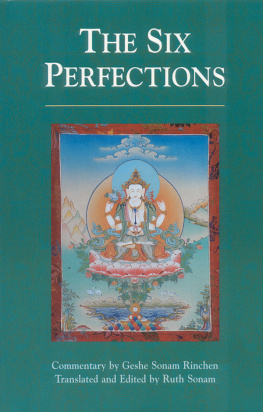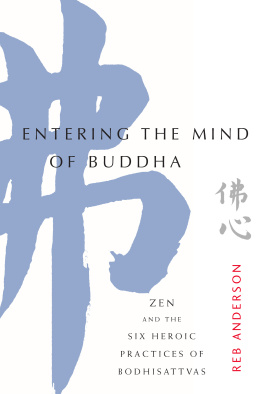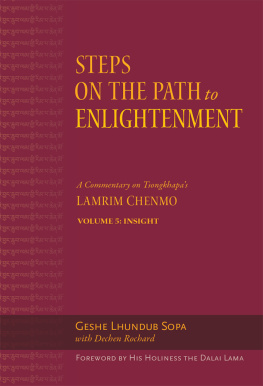THE SIX PERFECTIONS
An Oral Teaching by Geshe Sonam Rinchen Translated and edited by Ruth Sonam Snow Lion Publications Ithaca, New York
Snow Lion Publications P.O. Box 6483 Ithaca, New York 14851 USA Tel: 607-273-8519 Copyright 1998 Ruth Sonam Printed in Canada on recycled paper. All rights reserved. No portion of this work may be reproduced by any means without written permission from the publisher. ISBN 1-55939-089-1 Library of Congress Cataloging-in-Publication Data Sonam Rinchen, 1933- The six perfections : an oral teaching / by Geshe Sonam Rinchen; translated and edited by Ruth Sonam. p. cm. Includes bibliographical references ISBN 1-55939-089-1 (alk. paper) 1. Paramitas (Buddhism). 2. PerfectionReligious aspects
Buddhism. I. Sonam Ruth, 1943- . II. Title. BQ4336.S66 1998 294.3444-dc21 98-9466 CIP
Contents
Homage With homage to Mother Teresa (1910-1997) and to the unnamed women and men of noble heart who throughout the ages have performed the marvelous deeds of Bodhisattvas.The fruit of silence is prayer.The fruit of prayer is faith.The fruit of faith is love.The fruit of love is service.The fruit of service is peace.Mother Teresa
Acknowledgement I would like to thank my editor Susan Kyser for her assistance.
Introduction
To dream of reaching a destination is not enoughyou must pack your bags and set out on the journey. Bodhisattvas who are intent on enlightenment for the sake of all living beings make this a reality by adopting a certain way of life. All the advice the Buddha gave on this way of life and on the multifarious activities in which Bodhisattvas engage can be subsumed in the six perfections of giving, ethical discipline, patience, enthusiastic effort, concentration and wisdom. They comprise every practice needed to fully ripen oneself and others.There are four principal ways of ripening others, or helping them spiritually to mature. This is done through generosity in order to establish a positive relationship with them, through interesting discussion regarding what is of true benefit, through encouraging them to implement what they have understood and by acting accordingly oneself. Since these activities are included within the practices of the six perfections, they do not need to be explained separately.In his Ornament for the Mahayana Sutras which will serve as the basis for the following explanation of the six perfections.Maitreya points out that to accomplish the extensive practices in which Bodhisattvas engage for the attainment of ultimate well-being, namely an enlightened beings body, possessions, environment and companions, they need temporary well-being. This depends on an uninterrupted series of good rebirths in which they enjoy excellent conditions for continued spiritual practice, such as plentiful resources, a strong body and mind and supportive fellow practitioners. Nagarjunas Precious Garland defines temporary well-being or high status as the body and mind of celestial and human beings and the happiness they enjoy To gain this we need faith and ethical discipline.According to the sutras it takes many such rebirths to create the two great stores of merit and insight necessary for attaining enlightenment. If sutra and tantra are practiced together, enlightenment can be attained in a single lifetime by developing the kind of exalted wisdom which simultaneously and swiftly creates insight and merit. The ability to do this depends entirely on the high calibre of the practitioner and is firmly based on the three principal paths of insightthe wish to be free from cyclic existence, the altruistic intention and a correct understanding of reality.Practice of the six perfections insures that we will gain an excellent body and mind and even more favorable conditions for effective practice than those we enjoy at present. The Buddha taught that generosity leads to the enjoyment of ample resources. Since human happiness is intimately connected with material well-being, the practice of generosity is explained first in the context of the six perfections, the four ways of maturing others and the three major ways of creating positive energy.However, generosity cannot protect us from a bad rebirth in which it is impossible to make good use of these resources. Ethical discipline, another major way of creating positive energy, insures a good rebirth, while the practice of patience leads to an attractive appearance and supportive friends and companions. Cultivating enthusiastic effort endows us with the ability to complete what we undertake. However, even if we enjoy these conducive circumstances, our actions will not be effective so long as our mind is scattered and distracted by disturbing emotions. Fostering concentration, the third way of creating positive energy, makes our mind invulnerable to distraction. Unless we also possess the wisdom to discriminate between what needs to be cultivated and what must be discarded, we will consume the stock of positive energy created by previous wholesome actions without understanding what must be done to create new positive energy. By cultivating wisdom now we also insure that we will never lack wisdom in the future.As practitioners of the Great Vehicle our wish to possess such an excellent body and mind is first and foremost for the benefit of others, and the six perfections play an essential part in bringing about their good. Through material generosity we alleviate their poverty and build up a constructive relationship with them, but if at the same time we harm them physically or verbally, our generosity will be of very limited value. Restraint from such actions is ethical discipline, which cannot be maintained if we respond to harm with the wish to retaliate. Patience thus acts as a vital support for the practice of ethical discipline. By not retaliating we prevent conflict from escalating and help our opponents not to create further negative actions. Our lack of vindictiveness may even win them over and present an opportunity to help them.Enthusiastic effort is needed to complete what we undertake for others, while a stable concentrated mind and clear understanding of what is and is not constructive are also essential. The attainment of heightened concentration enables one to please and assist others through miraculous feats. Having made them receptive in these ways, wisdom is used in providing them with excellent advice, dispelling their doubts and showing them clearly how they can free themselves from cyclic existence. By fulfilling the needs of others through practicing the six perfections everything we wish for ourselves will be accomplished.Each perfection is more difficult to practice and more subtle than the preceding perfection from which it develops. If we are not attached to what we own and do not seek to acquire further possessions, we are in a good position to maintain ethical discipline. While practicing non-violence, if we can tolerate suffering and bear harm both from the animate and inanimate, we can undertake any task without feeling discouraged. The resultant energy enables us to make joyous effort in positive actions of all kinds. These causes give rise to the single-pointedness of a calmly abiding mind which can be used for gaining special insight into reality.Accustoming ourselves to giving will make us less attached to things. Guarding against carelessness through ethical discipline stops coarser forms of waywardness. The ability to accept and bear suffering prevents us from abandoning living beings. Unflagging enthusiasm is the way to increase virtue. Mental and physical pliancy attained through concentration stop disturbing emotions from manifesting, while close analysis increases wisdom and ultimately eliminates disturbing emotions and their imprints completely.In general, practice of the first three perfections is particularly directed towards others benefit, while practice of the last two is important for personal development. In both cases enthusiastic effort is vital, for freedom from both worldly existence and from a state of solitary peace is gained through wisdom, which requires the development of heightened concentration. This is impossible without enthusiastic perseverance.The Tibetan words which are translated as perfection mean gone beyond. These practices are called perfections because they are practiced by Bodhisattvas with the supreme intention of attaining enlightenment for the sake of all living beings. A perfection surpasses other practices in the way that exalted beings surpass ordinary beings, the ultimate surpasses the conventional, nirvana surpasses cyclic existence, and understanding surpasses nescience.A Bodhisattvas practice of the perfections gives rise to complete enlightenment, a state beyond both worldly existence and personal peace in which generosity, ethical discipline, patience, enthusiastic effort, concentration and wisdom have been perfected. Thus the cause is called by the name of the result. Practice of the perfections takes one to the other shore beyond the ocean of cyclic existence to a state in which the two kinds of obstructionsthose to liberation, formed by the disturbing attitudes and emotions, and those which prevent complete knowledge of all phenomenahave been completely eliminated.









